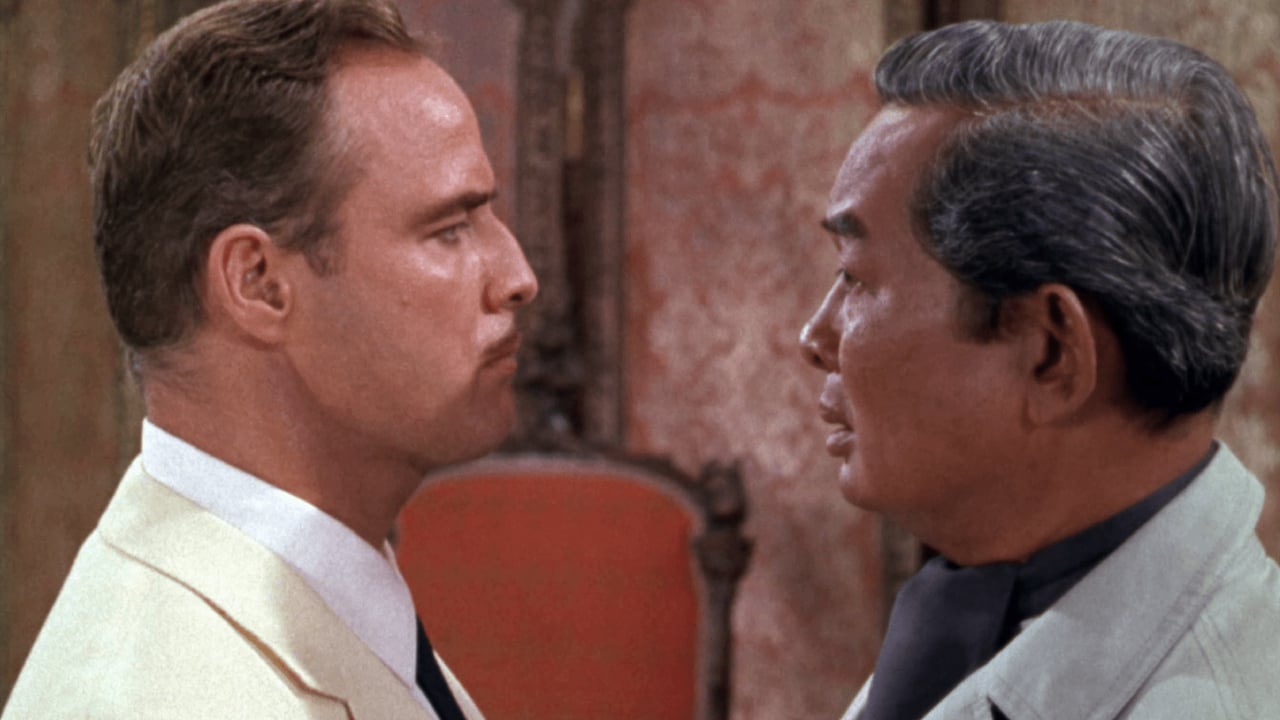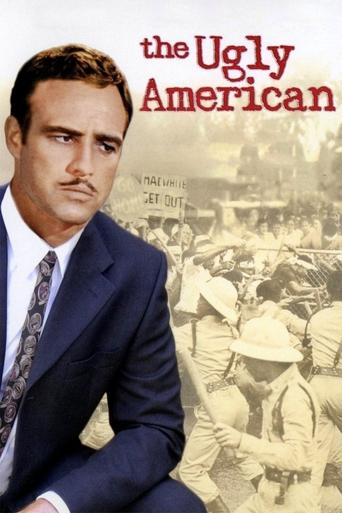


THE UGLY American (1963) is a very realistic film, a political drama featuring Marlon Brando as a new American diplomat in a Vietnam-like SE Asian nation that is painfully struggling between capitalist & communist factions, shot on location in Thailand. Eiji Okada plays the country's revolutionary leader, a previous best-friend of Brando who has become brainwashed by the communists. The ending cleverly shows how the average American is unconcerned with the political conflicts of other nations.The film runs two hours.GRADE: C+
... View MoreLike such cinematic oddities as "A Face in the Crowd" or "Johnny Guitar", "The Ugly American" invites for several questionings. Why didn't the film get much more recognition? Why did it fail to reach the same status as a lesser movie like "The Sound of Music"? Why even those who pretend to be movie fans tend to overlook it or didn't even hear about the title? Is it because it's a Marlon Brando picture that is not from the 50's or the 70's? Is it the title? The unknown director: who ever heard of George Englund anyway? The exotic setting that makes it look like another mindless escapist movie?In fact, the only reasonable answer I could come up with, is that the film was ahead of its time, which is not even meant as a compliment, since the film is not irreproachable. Released in 1963, a year more remembered for its political happenings than its movies' releases, it's prophetic in the sense that it's the closest depiction of the Vietnam War's Eve, and it's brilliant in the way it delivers a sort of anticipated "mea culpa" from the American perspective, by depicting the implication of America in the Vietnam territory at the pinnacle of the Cold War. Naturally, the names are changed, Vietnam becomes a fictionalized country named Sarkhan, but the rest of the film is too explicit to fool us.The film opens in a construction site, where a 'Freedom Road' is built to ensure the transport of products for the Sarkhanese. More than a road, it's the symbol of American inference against Communism, salutary from one side, unbearable from another. The film opens when an American truck driver who sympathized with a local worker by teaching him a few words of English is brutally murdered and his mouth filled of scotch. His assassins leave the truck tumbling, falling on the other workers, for one of the most spectacular stunts you'll ever see, even more impressive for the 60's and coming from a film of little action. The scene tends to contradict the title, because although the American were undesirable, we're still waiting for the character that'd define the titular 'ugliness'.If one thing, the opening invites us to feel sympathy toward the American victim, who's no more politically engaged than any other schmuck, he's just doing his job. His case resembles of Jocelyn Brando and Pat Hingle's couple, he's a chief engineer who opened a nursery with his wife and their lives will be spared thanks to the interference of the villagers. The film takes place during the Cold War, but it shows that the core of the conflict was ideological in the emptiest sense of the word. It's a bunch of artificial meanings when you confront them to reality. It's almost funny how the American insist that the national hero Deong, (Eiji Okada) is or is not a Communist as if it was an insult. Later, it's revealed that he was from an independent Nationalist movement for the people's sovereignty, but happened to be toyed by the Communists. Still, the general consensus which seems to end the film is that Americans are not better allies, because they forgot that these non-aligned movements are motivated by the same revolutionary impulses that gave its independence the USA. And that made me wonder, maybe people weren't ready for such explicit criticism, and that explains why the film was overlooked. Or maybe am I being too indulgent and the film does have some flaws. I wish they could let Eiji Okada, the actor who played Deong speak with his own accent, the guy seemed to struggle at each goddamn syllabus it wasn't acting, it was pure line's recitation. I even wondered if Brando's desperate look wasn't genuine. I also noticed some dialogs in English while it was spoken between Sarkhanese, and it sort of killed off the intended realism. However, the rest of the film is surprisingly good and entertaining, with some nice performances from Judson Pratt as the obnoxious Joe Bing, Sandra Church as the comprehensive wife and the scene-stealing performance of the prime-minister Kwen Sai who had the best lines of the film, almost stealing the show from Brando. Naturally, it's Marlon Brando's performance that elevates the film to its greatness, he's not only absolutely convincing as the ambassador, fittingly named Mac White, who exudes both charisma, sophistication and authority.MacWhite's introductory scene is perhaps one of the best tributes to Marlon Brando's natural talent, and the kind of which I would watch and re-watch just for the pleasure to listen to the lines. The film has the script, the acting, the directing from George Englund, yet it didn't get any Oscar nomination, and till now, the film is vaguely remembered, maybe by a fistful of people. Yet, the film is extraordinarily educational about one of the most shameful pages of American history. To understand the Vietnam War through conflict, many movies are must- see, but this one would be on the top of the list. If not the best, it's the best start.The film also offers an extrapolation of conflicts to come through the obsessive involvement of America in foreign conflicts in the name of ideals while it's more about profits than ideology. 10 years after "The Ugly American", Richard Nixon would prove all the final words of the Ambassador, that's how prophetic the film is, and I didn't even mention George W. Bush and the Iraqi conflict. "The Ugly American" has the intelligence of an Oliver Stone film, and although it's hard not to notice some minor flaws, it's a film that many should see and that deserve more and more recognition, it's daring, intelligent, thought-provoking and prophetic.I guess this is the kind of film for which the word "underrated' was invented.
... View MoreMarlon Brando gives a fair performance as the new American Ambassador elected to Sarkhan in Southeast Asia, which had been a peaceful, friendly nation fifteen years prior but is now being taken over by radical Communists distrustful of outside development. Adapted from the novel by William J. Lederer and Eugene Burdick, the dramatic, talkative picture (filmed mostly in Thailand) is a thoughtful rabble-rouser about conflicting political views. Brando's one native confidante in Sarkhan (wonderfully portrayed by Eiji Okada) admits to working both sides of the proverbial fence, which allows for a stimulating discussion of personal values in which common sense no longer comes into play. Although beautifully photographed by Clifford Stine, the results are literate and intriguing without being intrinsically exciting (at its core, the nature of the film is a tug-of-war, with the participants often engaged in a shouting match). Moving in fits and starts, one must sit through a great deal of pontificating before arriving at the conclusion, however the film's strongest scenes remain forceful and memorable. ** from ****
... View MoreThis film is loosely based on the novel of the same name by Burdick and Lederer, but departs from the novel in some significant particulars that I won't get into here. I think it is important to view this film as a period piece. Released in 1963 before the assassination of JFK and the escalation of the war in Viet Nam, the story retains a certain degree of naiveté about the role of the United States in the world and the perceptions of the United States that existed in other countries. This film would have looked quite different had it been shot in 1968 or 1969, by which time the country had long since shed any illusions about the nation's role in the world. In some ways, this provides a kind of still photo of the United States just prior to the Kennedy assassination and the tumultuous sequence of events that unfolded afterward. For that reason, this is a fascinating period piece that survives Brando's chewing on the scenery and a screen play that departs in unfortunate ways from the outstanding novel.
... View More